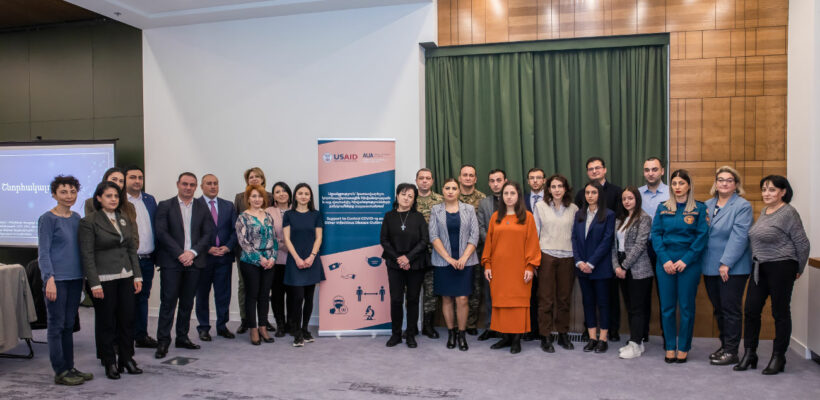
Investigating Armenia’s Legal Framework for Addressing COVID-19 Pandemic and Public Health Emergencies
2 min readYEREVAN, Armenia — The American University of Armenia (AUA) Fund, in collaboration with the Ministry of Health of the Republic of Armenia (RA), is implementing the United States Agency for International Development (USAID)- funded project Support to Control COVID-19 and Other Infectious Disease Outbreaks. The project is working to strengthen Armenia’s national capacity to control COVID-19 and other infectious disease outbreaks and emergencies of potential public health concern. The work implemented through this project aligns with, and is advancing, the RA government’s Public Health Emergency Preparedness and Response (PHEPR) Strategy.
On March 29, the AUA Turpanjian College of Health Sciences (CHS) and Open Center for Transformative Health Solutions jointly organized a stakeholder meeting with representatives from eight government ministries, including the Ministries of Health, Justice, Labor and Social Affairs, Emergency Situations, Finance, Economy, Defense, Territorial Administration and Infrastructure. The National Center for Disease Control and Prevention, Health and Labor inspection body, Department of Police, Office of the Prime Minister, and Office of the Human Rights Defender were also in attendance. During the meeting, AUA presented findings from its assessment of the legal frameworks guiding the national response to the pandemic. The presentation was followed by a discussion during which participants asked questions, exchanged ideas, and proposed recommendations that would improve government preparedness for responding to public health emergencies.
Based on the findings from the assessment of the legal aspect of the COVID-19 response and the discussions that followed, the participants suggested reviewing and adapting the law on emergency situations to make it more adaptable to addressing different situations. They highlighted the importance of communicating rules more comprehensively to the general public. Another suggestion was to augment awareness-raising activities in order to make the public well-informed about new regulations. A final proposition was to also utilize digital notifications to communicate with the general public in a state of emergency.
At the close of the meeting, participants expressed a renewed commitment to collaborate throughout the process of making legal reforms aimed at strengthening the government’s capacity to control COVID-19 and other infectious disease outbreaks and public health emergencies that may arise. In that regard, the participants will contribute proposed revisions to the law on “Legal Regime of the State of Emergency,” the law on “Population Protection in Emergency Situations,” and the law on “Assuring the Sanitary-epidemiological Security of the Population of Armenia” for improved harmonization of the laws and strengthening the state capacity in responding to emergencies of public health concern at all levels.
The Open Center for Transformative Health Solutions provides transdisciplinary education and collaborative experiences and stimulates collaborations outside the traditional public health disciplines to develop solutions to complex health problems modern societies face.
The AUA Turpanjian College of Health Sciences works actively to improve population health and health services in Armenia and the region through interdisciplinary education and development of public health professionals to be leaders in public health, health services research, and evaluation of health care delivery, and management.









